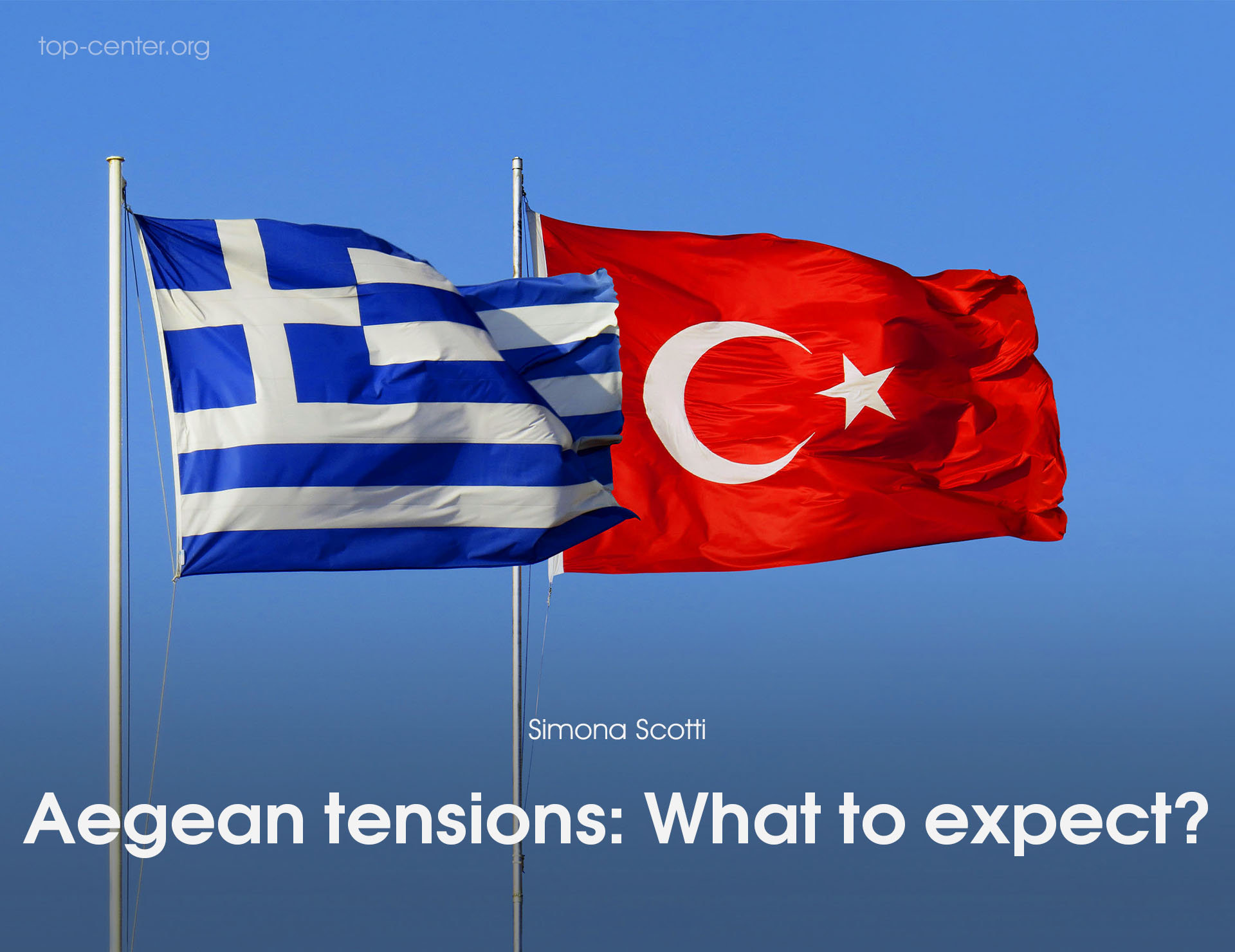Aegean tensions: What to expect?

For Greece and Türkiye, 2022 has witnessed a heated escalation of their longstanding, turbulent tensions. Since March, the two NATO allies have been making a series of mutual accusations of breaking international law, with Greece claiming that Türkiye violates its airspace and Türkiye accusing Greece of militarizing the Aegean islands. Notwithstanding that it is not the first time that Europe’s southeastern neighborhood turns into a hotspot of geopolitical tensions, the state of alert at the border is currently almost permanent, and there are concerns that the long-threatened military repercussions could now materialize.
The latest controversy between the two NATO members took place on December 19, with Türkiye accusing Greece of using several Hellenic Air Force fighter jets to sabotage a NATO training mission by “harassing” one of its aircraft. On the other hand, some Greek media have reported that 32 Turkish F-16 fighter jets entered the Greek airspace not only over the Greek islands but also over Athens.
Old rivalries
Turkish-Greek bilateral relations are rooted in old wounds. The two countries have long been at odds with each other over a series of maritime and energy issues, mainly due to their unique geographic diffusion. A considerable number of Greek islands are scattered all over the Aegean sea and are visible from Türkiye’s Anatolian mainland, hundreds of miles away from the Greek mainland. This situation allows Greece to retain territorial waters over a vast portion of the Eastern Mediterranean. Türkiye rejects the maritime boundary claimed by Greece, asserting that it violates its sovereign rights.
One of the cores of the Aegean dispute between Türkiye and Greece is to what extent the Greek islands off the Turkish coast should be considered for the determination of the respective Exclusive Economic Zones (EEZs). According to the Turkish standpoint, the distances should be measured from the continental mainland, claiming that the sea-bed of the Aegean geographically forms a natural prolongation of the Anatolian land. This would mean for Türkiye to be entitled to EEZs up to the median line of the Aegean - leaving out the territorial waters around the Greek islands in their eastern side. On the other hand, Greece claims that islands equally need to be taken into account, which would allow the Greek side to gain the economic rights over almost the whole Aegean Sea. The most vivid example is the tiny islands of Kastellorizo (or Meis, in Turkish), a few kilometers off the Turkish city of Kaş, which allows Greece to claim a vast maritime space between Rhodes and Cyprus, thereby blocking Türkiye’s only opening to the Mediterranean.
Moreover, by declaring to be an archipelagic country like Indonesia, Japan and the Philippines, Greece claims the waters that lie six nautical miles from each island, which does not allow for any Turkish territorial waters in the Aegean Sea. Conversely, Türkiye regards Greece as a peninsular country, with some islands laying on the Turkish mainland’s continental shelf. Although the United Nations Convention on the Law of the Sea (UNCLOS) allows extending the territorial waters up to 12 nautical miles, the Turkish administration has repeatedly made it clear that a similar enlargement will represent a casus belli, as it would result in a disproportionated unbalance of interests in the Aegean Sea, with Greece controlling 43.5% of the Aegean waters, while Turkey only 7.5%. Indeed, by increasing the extension of territorial waters to 12 nautical miles, the UNCLOS has favored countries controlling many nearby islands, including Greece. However, at present, the breadth of the territorial sea of both Türkiye and Greece in the Aegean remains 6 nautical miles.
Turkish activism in the Aegean Sea finds its foundation in the ambitious Mavi Vatan (Blue Homeland) doctrine, developed within the Turkish Navy, and it can be defined as a vision at the crossroads of maritime law and geostrategy. The doctrine came as a reaction to the Seville Map, adopted by the EU, that validates Greece and Cyprus territorial claims. The admirals who designed the Mavi Vatan doctrine argue that the UNCLOS has no legal value for Turkey, since it has never signed nor ratified it. The Convention’s very principles are considered inadequate for the geography of the Mediterranean Sea, because it consists of a confined space with hundreds of inhabited islands scattered all around. Considering the specificities of Greek-Turkish geography, the Mavi Vatan doctrine calls for a special regime in the region, disregarding the principles of the UNCLOS.
2022 developments
In mid-March, against the backdrop of Russian aggression in Ukraine, Turkish President Erdoğan received Greek Prime Minister Mitsotakis in Istanbul, and they discussed the particular responsibility shared by the two countries in the European security architecture following Russia’s invasion of Ukraine. However, just two months later, the animosity between the two countries returned. The resumption of the tensions came after Mitsotakis’ visit to the United States, where he addressed the U.S. Congress asking to oppose the sale of F-16 fighter jets to Türkiye, denouncing the violations of its airspace by the latter. Following the acquisition of a Russian S-400 air defense system, Türkiye was already excluded by the U.S. from purchasing F-35 fighter jets, as it was originally designed to detect and destroy NATO aircraft. Mitsotakis’ speech upset Erdoğan, who announced that "For me, no one named Mitsotakis will exist any longer from now on. [...] I will never accept [seeing] him again", before accusing his counterpart of being "dishonest". This episode put an end to the diplomatic talks that have been taking place between Ankara and Athens since 2021.
Since then, the two sides have accused each other of violating international law. Türkiye accuses Greece of militarizing the Aegean islands, which, according to the Treaty of Lausanne of 1923 and the Paris Treaty of 1947, are required to be demilitarized in order to remain under Greek sovereignty. Turkish Foreign Minister Mevlüt Çavuşoğlu stated that, if Greece refuses to demilitarize the Aegean islands, its sovereignty over them will be considered questionable. Moreover, Türkiye’s Defense Minister Hulusi Akar has recently accused Greece of provocative actions, claiming that Athens is pursuing “expansionist and aggressive policies” that “fuel instability”, and that Greece’s “hostile” approach towards the Aegean issue proves that it “has become arrogant to the extent that it ignores the fundamental principles and values of NATO.”
For its part, Greece justifies its military presence by the Turkish army's regular violations of air and sea space, claiming that they constitute a threat to Greece's sovereignty. Athens has been reporting continuous violations of its airspace, accusing the Turkish military aircraft of flying over its islands in the Aegean Sea. According to the Hellenic National Defense General Staff (HNDGS), which is in charge of monitoring the infringements of the Greek airspace, in 2022 there have been more than 20.000 violations of its national airspace - whereas in 2021 the violations amounted to less than 3.000, and in 2020, when Greece and Türkiye came close to conflict in the Aegean Sea, 4,605 violations were recorded. In 2013 there were only 577 violations, and the number increased to 1783 in 2019 when Ankara’s foreign policy started to be guided by the Mavi Vatan doctrine.
On the brink of war?
In a recent speech in Samsun referring to the Dodecanese islands, Erdoğan commented “You say Tayfun [n.b. Turkish ballistic missile], the Greek is scared. He says it will hit Athens. Of course it will. If you don’t keep calm, if you buy stuff from America for the islands, from here and there, a country like Türkiye will not sit idly by. It has to do something.”
However, despite the heated rhetoric by both parties, a full-blown conflict seems unlikely. Both Türkiye and Greece are NATO members and, as highlighted by Kathimerini diplomatic and defense correspondent Vassilis Nedos in an interview with Topchubashov Center, “a full-fledged war between two NATO members would immediately mean the end of NATO. No NATO could exist if two allies go to war with each other,” and “the impact would be catastrophic for the region as a whole, it would be a disaster for NATO, and it would be of course a disaster for both countries, [...] since both countries have the ability to achieve strategic hits against each other. I think that Greek-Turkish war would be something really bloody and no one wants to see that in the south-eastern flank of NATO, and it would lead to a rapid collapse of the regional order”. On the contrary, with regards to the possible scale of the conflict, Yusuf Erim, Editor-at-Large for TRT World, claims that “I don’t think it would be just a couple of rocky islands. Unfortunately it could very quickly get out of control, because we are talking about two countries that geographically have a tremendous amount of power at their disposal”.
In both countries, the economic situation is disastrous, and conservative forces are currently holding power. Next year, elections will take place in both Greece and Türkiye. In such critical circumstances, it appears that the tensions are primarily fuelled by electoral propaganda. In particular, approval ratings for Erdoğan have never been worse during his two-decade-long tenure, and he might be trying to appeal to nationalist and Islamist groups to consolidate their support. On the other hand, Mitsotakis’ conservative Nea Dimokratia party and most of its voters oppose negotiations to resolve the ongoing dispute. Accordingly, he does not seem interested in toning down the tough rhetoric either, in an attempt to secure his election next year.
For now, NATO Secretary General Jens Stoltenberg appears to be trying to remain neutral on the matter, avoiding making statements that could support one party’s claims. However, should the escalations deteriorate, NATO’s involvement would be inevitable. The difficult relations with Greece also represent a major liability for Türkiye in dealing with the European Union, and an open conflict with an EU member state and close ally of the United States would lead Türkiye to international isolation, which does not seem to be rational for Ankara. While peace and stability in the Eastern Mediterranean are continuously threatened, we could expect the tensions to remain at the same level as they currently are until the elections in both countries, while if the ruling right-wing forces change, tensions in the Aegean will probably noticeably decrease.







